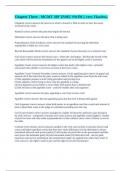Exam (elaborations)
Chapter Three - MGMT 209 TAMU SWIM || very Flawless.
- Course
- Institution
Litigation correct answers the process in which a lawsuit is filed in order to have the issues resolved by the courts Plaintiff correct answers the party that begins the lawsuit Defendant correct answers the party that is being sued Preponderance of the Evidence correct answers the standar...
[Show more]



